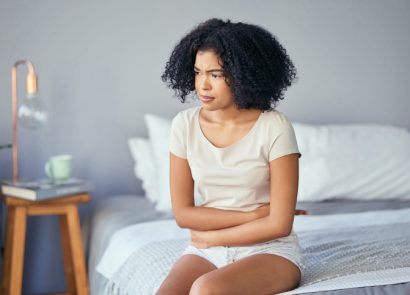We’ve all suffered from sleepless nights at some point in our lives, whether it’s due to stress, anxiety or too much caffeine, but continuously poor quality slumber can have a huge impact on our body, mood, diet and lifestyle. In fact, studies show that we eat about 500 calories more each day when sleep deprived and not getting enough can also put us at risk of medical conditions such as heart disease and diabetes. But have no fear, Craig Ballantyne, fitness coach and author of The Perfect Day Formula, (craigballantyne.com), has come up with a handy technique which will help you sleep better at night. The 10-3-2-1-0 formula is designed to help you switch off before you hit the pillow and be more productive the next day. Interested? Try it today with our simple guide.
10 hours before bed: No more caffeine
Craig says: “Caffeine stimulates the mind which keeps us awake, and while this is fine during the day, the effects can last long into the night. This creates a vicious cycle which means that we can’t sleep properly at night and therefore need to consume more caffeine during the day to stay alert.” If you’re still left craving a hot drink before bed, replace your cup of coffee with a warm glass of milk. Due to its calcium and serotonin content, milk can help you feel soothed, relaxed and sleepy, making it the ideal bedtime beverage. Or if you prefer, you can always substitute caffeine with decaf coffee, or mint and herbal tea.
3 Hours before bed: No food or alcohol
“Alcohol can help us fall asleep, but the sleep will be of poor quality which leads to fatigue in the morning, so it’s best to avoid drinking at least three hours before hitting the sack,” says Craig. Consuming a big meal or snack too close to bedtime can also sabotage your slumber. Eating activates your stomach acid which helps to digest food but this can make you feel uncomfortable when lying down, making it a struggle for your body to relax.
2 Hours before bed : No more work
“You need to have boundaries when it comes to work, especially if you want to gain a good night’s sleep,” Craig explains. By sacrificing those two hours of work before bed it’s more likely that you will be productive the next day due to a calmer, more refreshed mind. “If you struggle to find the ‘off button’ for your brain, I can relate,” he adds, “But in order to enjoy uninterrupted time with family and forget about work tasks, I’d suggest doing a ‘Brain Dump’. It’s a simple solution that takes five minutes and requires nothing more than a piece of paper and a pen. Write down everything going through your head. Get it all out. Now take that paper, set it aside, and forget about it for the rest of the day. This will help clear your mind which will allow you to wind down and get r1 HOUR BEFORE BED:for bed.”
1 Hour before bed: No more screen time
“Electronics might just be the worst distraction of all – our addiction to the buzz and beep of our phones, computers and binge-worthy TV shows keep us up late at night and tend to ruin our mornings as a result,” says Craig. Ditching Twitter and TV an hour before your head hits the pillow and replacing this with an old school paperback might just be the answer to a better night’s sleep. Getting into a page turner before bed has numerous benefits which make for sweeter dreams – reading has been scientifically proven to reduce stress, and after a while it will become a habitual bedtime ritual which your brain will associate with restful activities, helping to relax your mind before bed. Perhaps steer clear of horror writers though!
0: The number of times you’ll hit the snooze button
This technique should have you feeling refreshed and ready to start your day without the need to keep smacking the snooze button. In fact, the more you snooze, the more your body and brain become confused. Studies show the feeling of fatigue which follows snoozing can last for between two to four hours after you’ve got up. But don’t fret, Craig has a solution to help you overcome the temptation of delaying the inevitable – “Place your alarm across the room so that you are forced to get up before you can turn it off,” he says. “By then, you’re more awake and it’s easier to resist the allure of snoozing. A second approach is to internalise the benefits of getting up immediately – remember why it’s better to get up straight away rather than steal a few more minutes in bed.”
Four simple steps to sweeter dreams
Need more help? Alison Cullen, nutritional therapist at A.Vogel, also suggests these easy ways to guarantee a sweeter night’s slumber
1. If you have to go to the toilet, then try not to put the light on, as adjusting to light reduces your chances of falling speedily back to sleep.
2. Remove avoidable sources of noise, such as a ticking clock, or any electronic gadgets, especially if they twinkle or flash at you, too.
3. Don’t have the room too hot – it’s better to be a little chillier than you might like, and then warm up in bed. That said, try to avoid getting cold feet as this can stop you falling asleep in the first place.
4. Most people find that very strenuous exercise before bed makes them too alert and wired – but a few gentle stretches after a warm bath can help ease muscles and aid the wind down process.



















